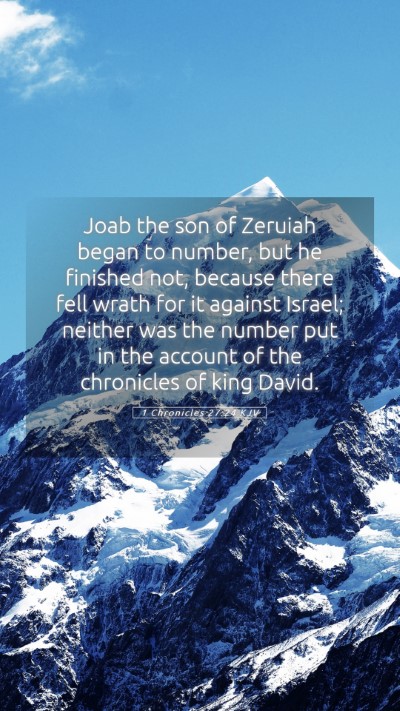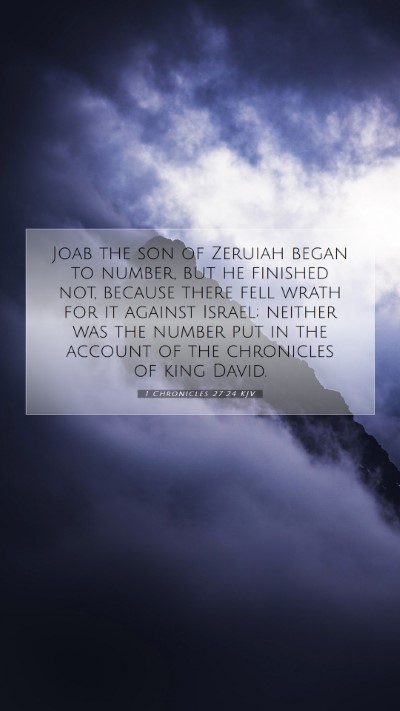Bible Verse Meaning: 1 Chronicles 27:24
Verse: "Joab the son of Zeruiah began to number, but he ended not, because there fell wrath for it against Israel; neither was the number put in the account of the chronicles of king David." (1 Chronicles 27:24, KJV)
Understanding the Scripture
This verse deals with a significant aspect of King David's reign, particularly concerning the census he ordered. The act of numbering the people here carries serious implications both politically and spiritually.
Bible Verse Interpretations
- Matthew Henry's Commentary:
Henry reflects on the reasons behind Joab's reluctance to complete the census. He emphasizes that this act of numbering the people stemmed from a lack of faith, suggesting that it was not merely a statistical effort but a misplacement of trust from reliance on the Lord's strength to human numbers.
- Albert Barnes' Notes:
Barnes elaborates on the consequences of this action, stating that the wrath of God fell upon Israel due to this census. He notes that this was not merely a political misstep but a spiritual failure, as it indicated a reliance on military strength rather than divine support, impacting the nation's relationship with God.
- Adam Clarke's Commentary:
Clarke highlights the context of why Joab did not fulfill the order to count the people. His commentary points out that divine displeasure over the census halted its completion, paralleling this with Scripture’s emphasis on faith over physical might. Clarke also provides a historical background to the narrative, linking it to the consequences seen in Scripture later on.
Bible Study Insights
The mentioning of Joab and the incomplete census brings forth several insights for modern readers:
- Faith vs. Numbers:
The verse serves as a reminder of the importance of reliance on God rather than human calculations. It emphasizes the spiritual dangers of turning to our own understanding and metrics in times of need.
- Consequences of Actions:
It illustrates that certain actions can provoke divine wrath, encouraging believers to seek God's will in their endeavors.
- Lessons for Leadership:
This text gives leaders today insight into the importance of spiritual integrity and dependence on God in their governance and decisions.
Historical Context of the Verse
Contextually, the event occurs during David's later reign, marking a time of prosperity but also increased temptation towards self-reliance. The Jewish culture had a dramatic history of covenant faithfulness, and any act steering away from trust in God carried dire spiritual implications.
Understanding the political landscape of Israel at that time, David's leadership was often scrutinized, and the actions taken against God’s commands had broad ramifications for the entire nation.
Cross References
This verse connects with several other passages within Scripture that discuss similar themes of reliance on God, God's anger towards Israel for their actions, and the importance of faithfulness:
- 2 Samuel 24:1-17 - Offers a parallel account regarding the census and its consequences.
- Exodus 30:12 - Details God’s command regarding numbering the Israelites and its implications.
- Psalms 20:7 - Illustrates the trust believers ought to place in God rather than in earthly measures like military strength.
Applying Bible Verses to Daily Life
1 Chronicles 27:24 encourages believers to reflect on their lives. Are there areas where they perhaps trust more in their own abilities rather than relying on God? It invites followers of Christ to reassess their priorities, putting their faith first in God's plans rather than empirical evidence of success.


